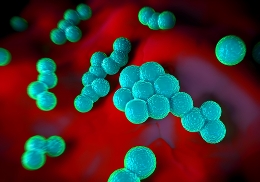13 September 2016
 Multidrug-resistant bacteria, or ‘superbugs’, are a serious global health concern.
Multidrug-resistant bacteria, or ‘superbugs’, are a serious global health concern.
To tackle this global health challenge, researchers from the University of Melbourne and the University of South Australia have been working to develop the next generation of polymeric antibiotics, referred to as SNAPPs, because of their ability to kill bacteria by ‘snapping’ their membranes.
Gram-negative ‘superbugs’ are a particular threat to patient health outcomes because they are antibiotic resistant and very few new antibiotics are currently being developed by pharmaceutical companies.
In an article published tomorrow in Nature Microbiology UniSA School of Pharmacy and Medical Sciences Senior Lecturer, Dr Anton Blencowe, and the team of University of Melbourne researchers note there is an urgent need for alternative antibiotic treatments for pathogens that are responsible for the majority of hospital acquired infections.
“These new synthetic antibiotics (SNAPPs) are modelled on naturally occurring antimicrobial peptides, but have a distinct dendritic structure and simplified amino acid composition,” Dr Blencowe says.
“We found the SNAPPs to be highly efficient at killing Gram-negative bacteria at very low doses, including their multidrug-resistant strains.
"In preliminary trials, SNAPPs displayed excellent biocompatibility and activity within a living organism or natural setting and multi-drug resistant bacteria treatments were successful, while treatment with other antibiotics used for severe bacterial infections failed.
“The unique structure of SNAPPs allows them to attack bacteria through multiple pathways, which helps to prevent the development of antibacterial resistance.
“Even after 600 generations of growth over 24 days in the presence of sub-lethal concentrations of SNAPPs, multidrug-resistant bacteria capable of mutating displayed no resistance to lethal doses.
“The excellent antimicrobial activity of SNAPPs, combined with good biocompatibility, and relatively simple manufacture, make this new class of antimicrobial agents a significant advance in the fight against multi-drug resistant bacteria.”
Combating multidrug-resistant Gram-negative bacteria with structurally nan engineered antimicrobial peptide polymers in Nature Microbiology published: 12 September 2016 article number:16162 doi: 10.1038/nmicrobiol.2016.162
Media contact: Katrina McLachlan mobile: 0414972537 email: katrina.mclachlan@unisa.edu.au




